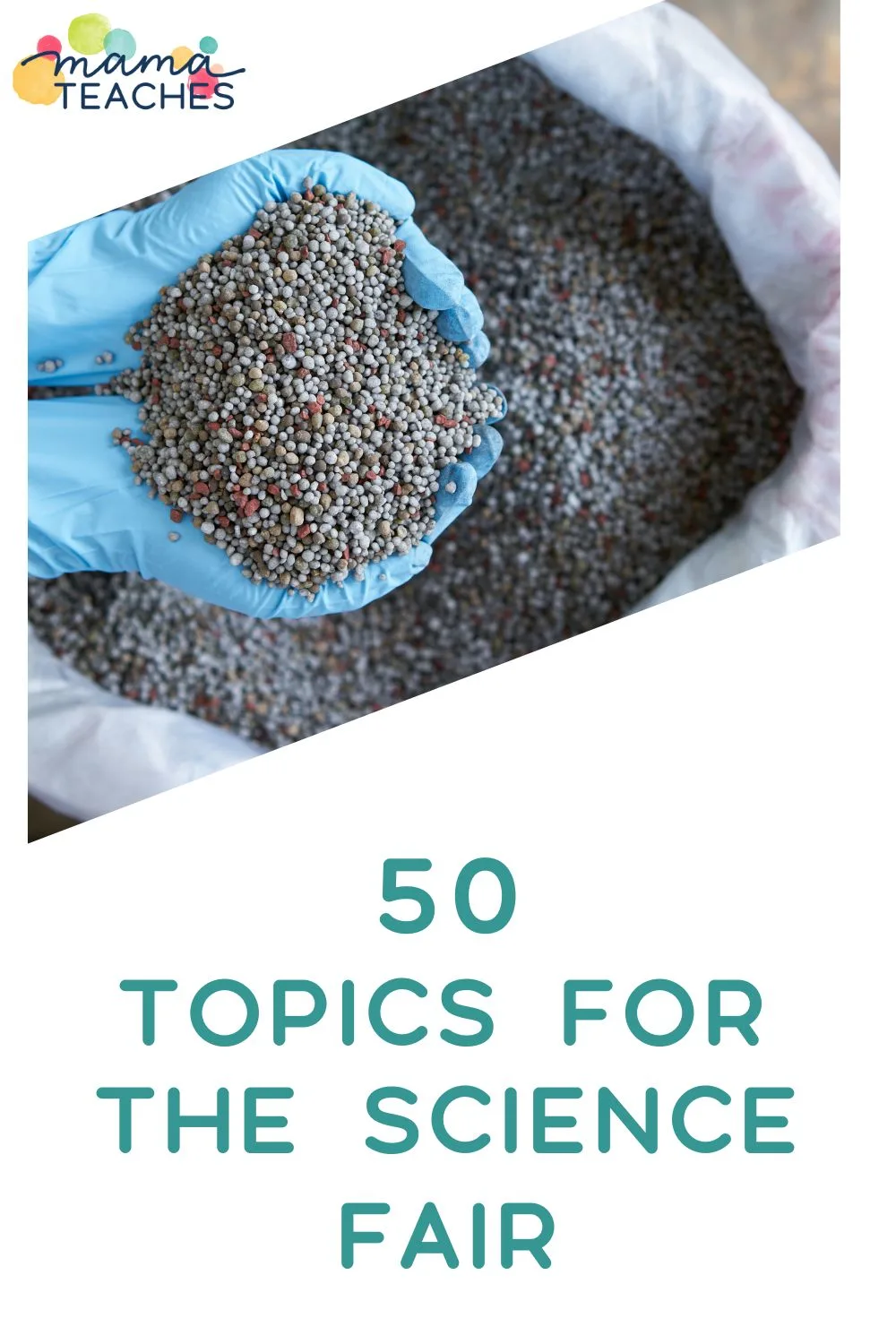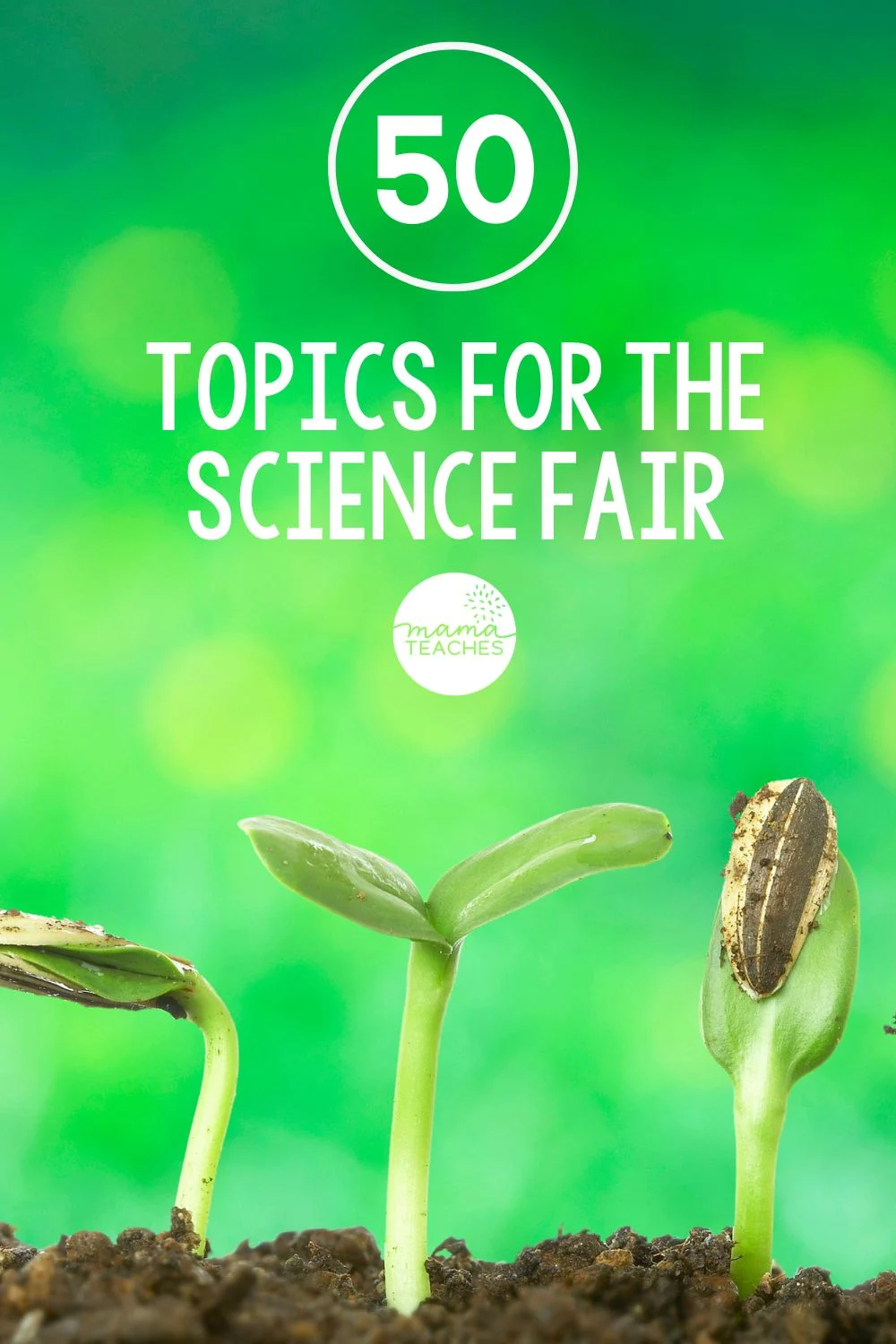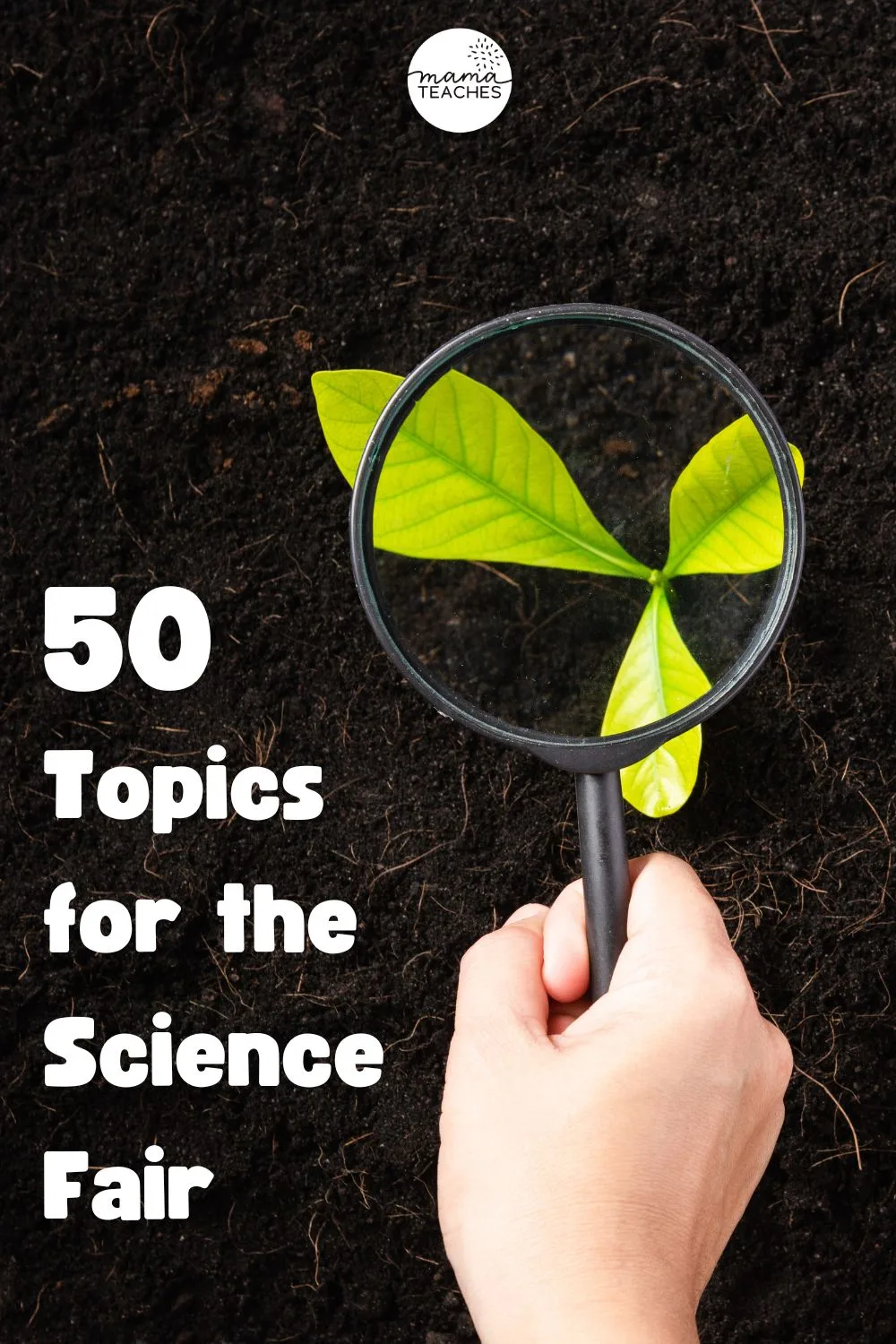Are you looking for a unique (yet doable) science fair project? Look no further than this list of 50 topics for the science fair.

What Makes for an Outstanding Science Fair Project?
The goal of the science fair is threefold.
It enables students to practice the scientific method, research a topic that interests them, and work on presentation skills.
The best science fair projects are age-appropriate.
Don’t choose one that is overly complicated or requires prior knowledge that grades above the student’s current level.
Be wary of projects that involve living things. Those can get complicated (and go sideways) fast!

This article contains affiliate links to things that you might like.
How to Choose a Science Fair Project
When choosing a science fair project, look closely at the guidelines for your science fair.
Does it require an experiment (where you develop a hypothesis to test), or is a demonstration permissible?
Some science fairs allow research projects as well.
If you perform an experiment, how many variables can you have?
A basic science fair experiment has only one independent variable (the one thing you change).
For example, if you are testing the effects of different fertilizers on plant growth, you would use identical plants, location, temperature, amount of water added daily, etc.
The one thing that you would change is the type of fertilizer.
50+ Science Fair Topics
These topics for the science fair are grouped by category. Choose one that sparks your student’s interest and suits their ability.

Plant Topics for the Science Fair
The effects of different types of fertilizers on plant growth.
Add different types of liquid fertilizer to plants.
Examining the impact of music on plant growth.
Expose plants to different genres of music (or different volumes), but include silence as your control.
Analyzing the effect of different types of water on seed germination.
Use different types of water (tap water, mineral water, filtered water, distilled water, etc.) and see if it affects how many seeds germinate.
Analyzing the effect of different types of soil on plant growth.
Put plants in various pre-packaged soils from the nursery. Soil from the yard may have other seeds in it.
Analyzing the impact of air pollution on plant health.
This lends itself well to a research project. You could also collect leaves from the same plant in various areas where pollution occurs.
Analyzing the impact of magnet strength on plant growth.
Scientists theorize that the earth’s magnetic field affects seed germination and plant growth.
Add two magnets to the soil of germinating plants and see if they affect how fast or in which direction a seed germinates.
Exploring the effect of different types of light on plant growth.
Expose plants to different types of light: no light, direct sunlight, indirect sunlight, fluorescent, and incandescent light.
Investigating the relationship between electromagnetic radiation and plant growth.
Do plants grow well when exposed to electromagnetic radiation (like that from a major appliance or wireless router)?

Animal Topics for the Science Fair
Do animals display handedness like people?
You can design an experiment with cats and a toy on a string. Do cats use a dominant paw?
What type of light attracts the most moths?
Set up sheets at night and shine different light colors (or different types of light) on each sheet. Which one collects the most moths?
Which dog Is the smartest?
If you have friends who all have dogs (so you have a large sample size), you can use simple tests for intelligence.
You can test for object permanence (by hiding a treat). You can set up an obstacle course. Create your own series of tests or revamp time-tested ones.
How does huddling affect heat?
Why do newborn puppies, kittens, and piglets huddle together? Does it really keep them warmer?
You can design an experiment to test this by filling glass jars with warm water.
Measuring the temperature loss over time when set apart versus huddled together.

Human Body Topics for the Science Fair
Some of these topics for the science fair make for outstanding research projects or demonstrations.
Investigating the relationship between exercise and heart rate.
Use a heart rate monitor to measure the relationship between different types of exercise.
Examining the impact of different colors on memory retention.
Create a test where you have print in different colors. How well do participants remember sentences printed in different color ink?
Investigating the relationship between caffeine and reaction time.
You can design an experiment where you give subjects caffeinated soda or coffee (or decaffeinated – but don’t tell them which one they are getting).
They can then complete an online reaction time test.
Exploring the effect of music on concentration and productivity.
Design a timed productivity test with tasks to complete (like “sort these numbers from largest to smallest”).
Play different types of music during the test and compare the results to taking the test in silence.
Examining the effectiveness of natural remedies for common ailments.
This is best suited to a research project.
Investigating the relationship between sleep duration and academic performance.
This is another topic that works well as a research project.
Investigating the relationship between stress levels and immune system function.
Here is another research project.
Investigating the relationship between sugar consumption and tooth decay.
You can design an experiment where you decay teeth (if you have access to old teeth from children or an oral surgeon).
Submerge them in regular soda, diet soda, water, and apple juice.
You can use eggshells if you don’t have access to teeth.

Investigating the relationship between screen time and sleep quality in teenagers.
You can do a research project or ask volunteers to record their screen time and use their smartwatches to rate their sleep quality.
Examining the effectiveness of natural remedies for headaches.
This is a research project.
Investigating the relationship between food coloring and behavior in children.
This is another research project.
Investigating the relationship between air pollution and respiratory health.
This is also a research project.
Exploring the effect of different types of exercise on flexibility.
How flexible are players of various sports? Ask teams to complete a flexibility test.
Examining the effectiveness of natural remedies for cough and cold.
This is another research project.
Investigating the impact of different types of music on heart rate.
Use a heart rate monitor and measure the change in heart rate when listening to different types of music (and silence).
Investigating the relationship between caffeine consumption and sleep quality.
Like the previous sleep quality experiment, ask volunteers to track their sleep quality with their smartwatches.
Examining the effectiveness of natural remedies for allergies.
This is another research project.

Physical Science Topics for the Science Fair
These science fair topics are related to chemistry and physics.
Exploring the effect of temperature on the rate of chemical reactions.
Perform a standard chemical reaction of your choice (e.g., baking soda and vinegar in a graduated cylinder) at different temperatures of the reactants.
How long does the reaction complete when the vinegar is heated vs. cooled?
Analyzing the effect of temperature on battery performance.
Do batteries last as long in a cold space as they do in the heat?
Exploring the effect of different types of water on crystal growth.
Use a crystal kit (or make your own super-saturated crystal solution) with different types of water (filtered, tap, distilled, mineral).
Exploring the effect of different types of water on ice crystal formation.
Instead of forming mineral crystals, freeze the water. Does the type of water affect its freezing point?
Examining the effectiveness of various methods for removing stains.
Choose different liquids that specialize in stain removal. Which works best?
Analyzing the effect of temperature on the viscosity of liquids.
How does a viscous (sticky) liquid behave at various temperatures?
You can test how long it takes to pour honey, syrup, glue, and other viscous liquids at various temperatures.
Examining the effectiveness of various methods for water filtration.
Test your water source for various minerals using a mineral test strip.
Use various water filtration methods and test again. How effective were the filtration methods?
Exploring the effect of different types of fertilizer on soil pH.
Does fertilizer change the pH of soil? Use pH test strips to find out.

Microbiology Topics for Science Fair
Investigating the antibacterial properties of various household cleaners.
You can clean a surface with a cleaner and then swab it.
Smear the swab in a prepared petri dish and attempt to grow bacterial cultures.
Analyzing the impact of pH on enzyme activity.
Add the enzyme catalase to different concentrations (acidities) of hydrogen peroxide. Measure the height of the bubbles.
Exploring the effect of temperature on the growth rate of bacteria.
Culture bacteria and place the cultures in different temperatures.
Where is the worst place to leave your toothbrush?
Swab different possible locations for your toothbrush and see which one grows the most bacteria!

Engineering Topics for the Science Fair
If it’s permissible in your science fair, you can complete an engineering design project. This is different from following the scientific method.
You use your creativity and ingenuity and follow the engineering design process.
Make a solar cell.
Use copper flashing, salt water, and a soda bottle to make a solar cell.
Which type of bridge is the strongest?
Make various bridge designs from popsicle sticks and wood glue, then test their weight-bearing strength.
What is the minimum drop height to loop height ratio in roller coasters?
Construct a loop Hot Wheels track and find the minimum incline height to propel the car through the loop.
Investigate the relationship between temperature and elasticity of rubber bands.
How far does a rubber stretch at different temperatures?
Designing a water clock.
Use the engineering design process to construct a clock that measures time by steady drips.
Designing an automatic pet feeder.
Can you design a pet feeder that automatically dispenses food?

Other Science Fair Topics
Investigating the effect of different cooking methods on nutrient retention in fruits and vegetables.
Cook high vitamin C foods in various ways and test their levels of vitamin C using a vitamin C reagent.
Examining the effectiveness of different natural dyes on fabric.
Make your own natural dyes using plants and test their ability to adhere to fabric.
Investigating the impact of different types of packaging materials on food preservation.
Compare how well food is preserved by wrapping samples in waxed paper, tin foil, plastic wrap, zipper baggies, and resealable containers.

Science Fair Topics Using Kits
Purchasing science kits can remove the headache of sourcing your project materials.
Investigating the effects of acid on food spherification (like boba).
Compare liquids of various acidities and test their ability to form perfect spheres using a food spherification kit.
Testing the effects of essential oils on bacteria.
These pre-made petri dishes, complete with agar, are perfect for culturing bacteria.
Use your own essential oils and test their effect on the bacteria samples.
How to desalinate water
Build a desalination kit to remove salt from water. This is a demonstration kit.
Which fruits and vegetables work as batteries?
Test different fruits and vegetables with this kit to see if they generate enough electrical energy to power a clock.
Make a volcano erupt.
This classic science fair demonstration is easy to assemble with this volcano kit. It makes a 1.5-foot volcano.

Inspiring Topics for the Science Fair
These topics for the science fair come in every category. Find one that appeals to your student and suits their ability level.
The science fair is sure to be a success!
